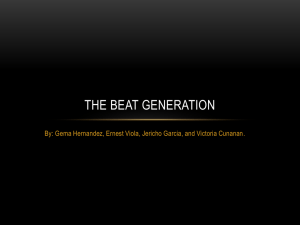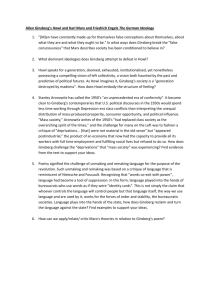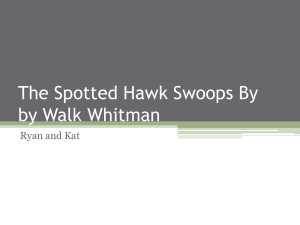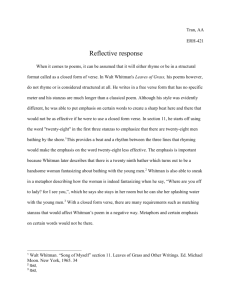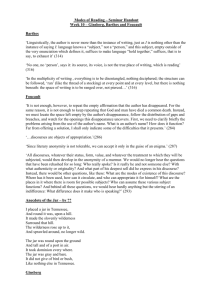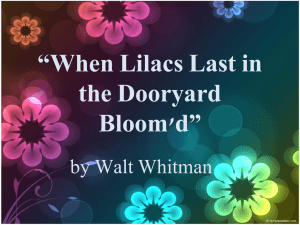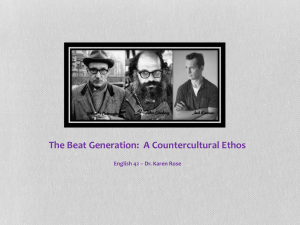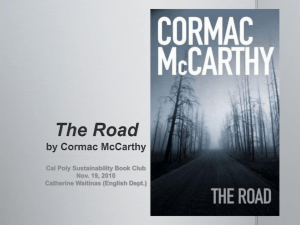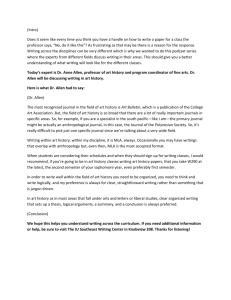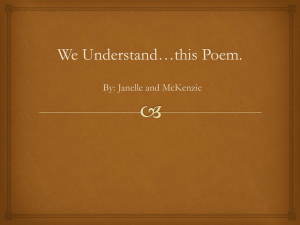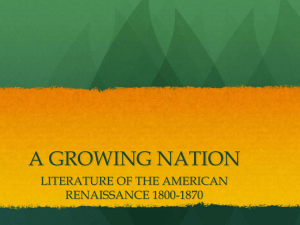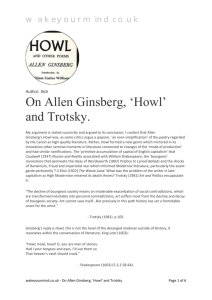A Beats Generation Artist
advertisement
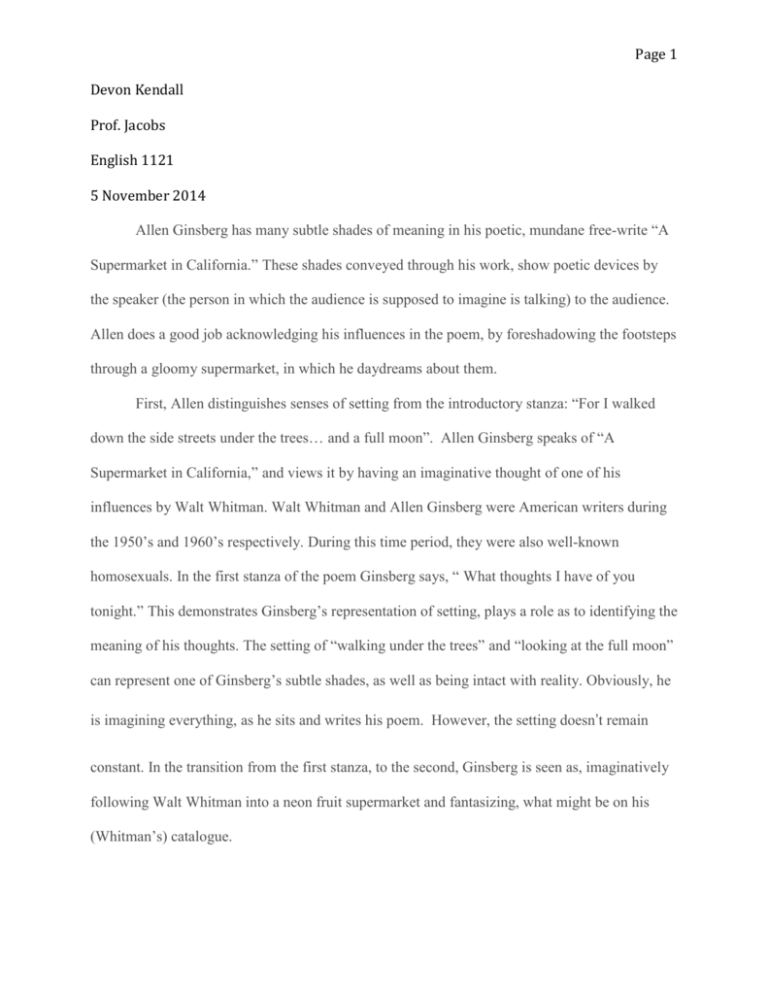
Page 1 Devon Kendall Prof. Jacobs English 1121 5 November 2014 Allen Ginsberg has many subtle shades of meaning in his poetic, mundane free-write “A Supermarket in California.” These shades conveyed through his work, show poetic devices by the speaker (the person in which the audience is supposed to imagine is talking) to the audience. Allen does a good job acknowledging his influences in the poem, by foreshadowing the footsteps through a gloomy supermarket, in which he daydreams about them. First, Allen distinguishes senses of setting from the introductory stanza: “For I walked down the side streets under the trees… and a full moon”. Allen Ginsberg speaks of “A Supermarket in California,” and views it by having an imaginative thought of one of his influences by Walt Whitman. Walt Whitman and Allen Ginsberg were American writers during the 1950’s and 1960’s respectively. During this time period, they were also well-known homosexuals. In the first stanza of the poem Ginsberg says, “ What thoughts I have of you tonight.” This demonstrates Ginsberg’s representation of setting, plays a role as to identifying the meaning of his thoughts. The setting of “walking under the trees” and “looking at the full moon” can represent one of Ginsberg’s subtle shades, as well as being intact with reality. Obviously, he is imagining everything, as he sits and writes his poem. However, the setting doesn’t remain constant. In the transition from the first stanza, to the second, Ginsberg is seen as, imaginatively following Walt Whitman into a neon fruit supermarket and fantasizing, what might be on his (Whitman’s) catalogue. Page 2 Secondly, in his poem, Allen Ginsberg is adventurous, conscious, hungry, and lonely. He consciously scans the neon fruit supermarket, noticing nuclear families, and visions a dear influence, Garcia Lorca “down by the watermelons”(8). Ginsberg hints out his recognition of Garcia Lorca but does not seem to acknowledge her as much as he visions his male companion, Walt Whitman, throughout the course of that night in California. Garcia Lorca was a feminist Spanish poet in the late 19th century and, like Whitman and Ginsberg, she was also homosexual. Approaching the remaining stanzas, Ginsberg characterizes Whitman absurdly in stanza four, distinguishing him as a “childless, lonely old grubber” (9). Likewise, Ginsberg uses figures of speech to throw subtle shades at Whitman’s' sexuality, by corrupting words and telling us that he was “poking among the meats” and “ eyeing the grocery boys”(10). Both quotations could be seen as an acknowledgement to his portrayed sexuality. The reality that Ginsberg as the speaker is actually following his influencer, Walt Whitman, was shown as he says; “I wandered in and out of the brilliant stacks of cans, and followed in my imagination by store detectives” (13). Subsequently, they’re walking down different aisles possibly at the same pace. While reading the remaining stanzas of “A Supermarket in California,” Ginsberg as the speaker switches from a singular “I” to a plural “we” subject by saying; “We strode down the open corridors together in our solitary fancy, tasting artichokes, possessing every frozen delicacy, and never passing the cashier” (16). Page 3 In this poem, solitary means-going along without companionship, they were not together, but Ginsberg visions following Whitman’s behavior which justifies uncertainties as to why the store detectives might be following them. The speaker in the following sentence says, “Where are [Allen and Whitman] going? The doors close in an hour. Which way does [Whitman's] beard point tonight” (17-18). In retrospect, Allen Ginsberg’s imagery leads me to believe that he might have been truly influenced by the Whit Whitman’s beard because both of them had long beards. After heading out of the neon fruit supermarket, back into the reoccurring setting “the trees add shade to shade, lights out in the houses, we’ll both be lonely” (22). The setting sets up tone for this quotation by representing alienation because the setting is gloomy, unattended and both didn’t mind solitary walks. Allen Ginsberg as the speaker, daydreams him and his influencer thinking about a similar alienated thought: “Will we stroll dreaming of the lost America of love, past blue automobiles in driveways, home to our silent cottage”(24)? When examining the lines of imagery in which the speaker gives his insight, my reaction to Allen Ginsberg and White Whitman is that they’re both hopelessly single males walking back to their lonely lifestyle. The reference to a lost America can mean it was dark and desolate outside, love stands out in the family blue automobile parked in front of the house with the lights off. Ginsberg analysis of the scenario walking by himself, observing his surroundings leads me to think that there’s been no place like that in which he and Whitman can go. In the genre of poetry “ A Supermarket in California,” by Allen Ginsberg ends differently than any other poet might have, during beats generation time period. The end of the poem is a very mundane, secular cliffhanger. He foreshadows two classical mythologists: “Charon” and “Lethe” (26). Charon was conveyed as a carrier. Charon carried souls of dead people across a river, which marks the boundary between the world of the living and the world of the dead. Furthermore, Lethe was a known river. Allen Ginsberg creatively imagines these two in a secular yet formal way by saying, “Dear Father” (25), who is assumed to be Walt Whitman. Altogether, this poem is very dark and has many subtle shades, these shades conveyed through his work, help show poetic devices. WORK CITE Ginsberg, Allen. "A Supermarket In California." Literature for Composition: An Introduction to Literature. Ed. Sylvan Barnet, William Burto, and William E. Cain. 10th ed.1290-291. Print.
